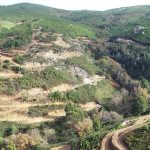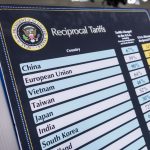What impact can economic diplomacy have on the internationalization of companies?
The impact of economic diplomacy on the internationalisation of companies and the power of entrepreneurialism in attracting capital were among the topics discussed at the conference ‘Economic diplomacy in the world of business’ organised by Diaspora Prime at Lisbon’s Católica University in March.
Text and Photo: Chris Graeme
Portugal is a small, peripheral country in Europe, with a modest internal market, which is why it is important that it has an open economy with companies focused on internationalisation.
“Our internal market on its own does not generate the necessary wealth for Portugal to live comfortably”, said Professor Bernardo Ivo Cruz, a university professor and former secretary of State for Internationalisation. (2022-2024)
This was why Portuguese companies, the majority of them micro and small companies, have to conquer overseas markets and find new clients while attracting structural investments for job and wealth creation.
Another issue linked to this question is the relationship between the State and private agents, and how the two can cooperate so that companies can be successful overseas and compete for foreign direct investment. (FDI)
The success of Portugal’s companies in internationalisation in recent years means that now around 50% of its GDP results from exports and FDI.
Building support networks
Vítor Olivera, the Secretary General of SEDES Europe, (A Portuguese civic association) said the importance of soft power should not be underestimated in commerce and investment attraction, which is why having mutual support networks around the world was important for Portugal’s international projection.
However, he lamented that more than 50% of Portugal’s talent went overseas and the country seemed unable to retain it. The Portuguese State needed to follow up on them through its diplomatic and chambers of commerce networks, and leverage their influence working in large companies overseas like Amazon or Airbus to help unblock investment.
And because of the conflict in Ukraine, Portugal – and this was unfortunate for Eastern Europe – could benefit as a safe haven. “We are seeing companies moving to and investing in Portugal. It’s important to maintain contact with our professionals overseas, as well as looking how we can create more soft power influence in international institutions,” he said.
Building a brand
Isabel Neves, a successful Business Angel and currently the President of United Nations Portugal who has a vast experience helping young entrepreneurs and innovators in areas such as commerce, retail, bioenergy, education, and tourism, said it was down to young entrepreneurs to be the “best ambassadors for Portugal overseas”.
“They are the ones that take the best that we have to the four corners of the world; their abilities and knowledge and making their mark in all the countries in which they work. I think they have a fundamental role throughout the world.”
She lamented that Portugal’s brand worldwide had yet to take root and be well built. “When you think about France, you think of luxury, in Italy, it’s design, in Germany, efficiency. And what about us?” Perhaps hospitality and tourism? But it wasn’t enough.
“This Portugal brand is not wholly formed and I think this generation of young people who have the abilities to spread throughout the world and work in overseas companies or academic institutions can transmit what Portugal represents as a band.”
Lobbying vital
Isabel Neves stressed that economic diplomacy done with State support, (through business and industrial associations, embassies, the overseas investment bureau AICEP and chambers of commerce), has done a lot to build this brand, but it wasn’t enough.
“It’s also important that Portugal has quality products and services to offer the international markets” adding that lobbying was often seen as a dirty word, but was important and vital for Portuguese companies to adequately play their corner.
“There has to be a complement between Portuguese companies, associations and the State to build this brand,” she remarked.
“We might have a lot of money to invest in internationalisation, but of it’s not well managed this money will be wasted and fail to make an impact, she added.
Considering cultural differences
Vasco Ribeiro, a professor at Santarém University, writer and author, who has an academic background in diplomacy, and is an expert in luxury tourism, said, “we’ve always been at the centre of various paradigms and we’re aware that the world is changing and that the new generation behaves completely differently to previous ones at social, political, commercial, economic and entrepreneurial levels”.
However, he advised that the cultural aspect could never been discarded. “We might have an excellent Portuguese company, team and products but when it comes to doing business in other countries we often overlook or ignore cultural differences.”
Vasco Ribeiro pointed out that while we are all human beings, we are all culturally different which brings diversity and cultural richness, but needed to be considered when doing business overseas. “When in Rome do as the Romans, and this is something we often fail to do and must in order to understand the modus operandi when doing business overseas,” he said.
But when does investing overseas become too much? Referring to the troika period (2011-2014) when Portuguese companies had to turn their attentions overseas to compensate economic difficulties at home, Bernardo Ivo Cruz said that there had been a great desire to access the Brazilian market that was booming at the time, until the then minister of Finances of Brazil called on overseas companies not to invest more because its economy didn’t have the capacity to absorb more FDI.
“We need to be aware of this and diversify investment to other places”. There was also the very “protectionist nature of the Brazilian economy and cultural barriers despite speaking the same language”, he said.
Leaving final notes on how Portugal could develop its internationalisation, Isabel Neves said it wasn’t just about exporting. There were other forms of economic diplomacy such as the exchange of experience and know-how and geopolitical considerations such as proximity to Africa and America. The second was the strength of Portugal’s startups in areas such as healthcare, life sciences, biotechnology, and tapping into the potential from the Portuguese diaspora spread throughout the world.










